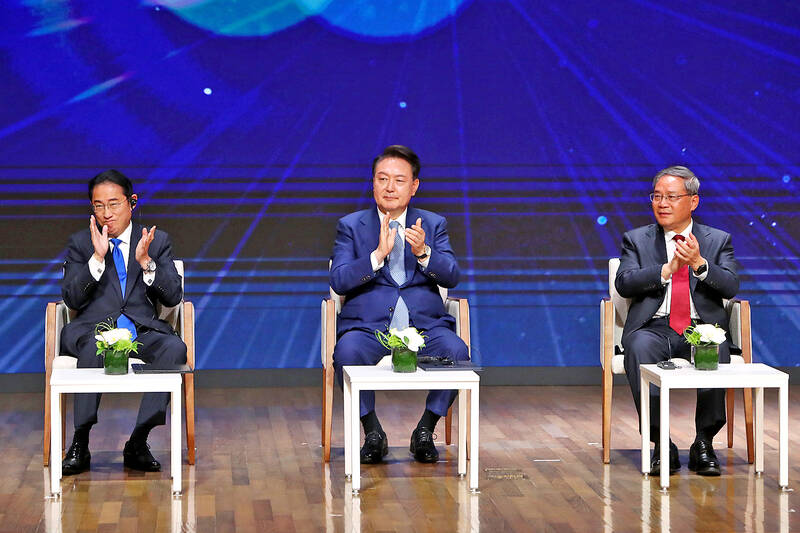Leaders from South Korea, China and Japan yesterday reaffirmed their goal of a denuclearized Korean Peninsula, during a rare summit at which they also agreed to deepen trade ties.
The summit brought together South Korean President Yoon Suk-yeol, Chinese Premier Li Qiang (李強) and Japanese Prime Minister Fumio Kishida in Seoul for the countries’ first trilateral talks in nearly five years, partly due to the COVID-19, pandemic but also to once-sour ties.
While North Korea was not officially on the agenda, hours before the leaders met Pyongyang announced that it would soon put another spy satellite into orbit — a move that contravenes rafts of UN sanctions barring it from tests using ballistic technology.

Photo: EPA-EFE
At a joint press conference, Yoon and Kishida urged North Korea to call off the launch, with the South Korean leader saying it would “undermine regional and global peace and stability.”
Yoon also called for a “decisive” international response if Kim went ahead with his fourth such launch — aided by what Seoul claims is Russian technical assistance in exchange for Kim sending Moscow arms for use in Ukraine.
However, China, North Korea’s most important ally and economic benefactor, remained notably silent on the issue, with Li not mentioning it during the briefing.
In a joint statement issued after the talks, the countries reaffirmed their commitment to the “denuclearization of the Korean Peninsula,” adding that peace “serves our common interest and is our common responsibility.”
Pyongyang hit back immediately, saying in a statement by a North Korean Ministry of Foreign Affairs spokesperson that “to discuss the denuclearization of the Korean Peninsula today constitutes a grave political provocation.”
The three countries yesterday also announced that they would arrange “discussions for speeding up negotiations for a Trilateral FTA [free-trade agreement],” and boost three-way cooperation, including holding summits on a regular basis.
Li also said they had agreed on not turning “economic and trade issues into political games or security matters, and rejecting protectionism as well as decoupling or the severing of supply chains,” Xinhua news agency reported.
After their talks, Yoon, Li and Kishida joined a business summit aimed at boosting trade between the countries, which was also attended by top industry leaders.

The Ministry of Foreign Affairs (MOFA) yesterday said it is closely monitoring developments in Venezuela, and would continue to cooperate with democratic allies and work together for regional and global security, stability, and prosperity. The remarks came after the US on Saturday launched a series of airstrikes in Venezuela and kidnapped Venezuelan President Nicolas Maduro, who was later flown to New York along with his wife. The pair face US charges related to drug trafficking and alleged cooperation with gangs designated as terrorist organizations. Maduro has denied the allegations. The ministry said that it is closely monitoring the political and economic situation

Conflict with Taiwan could leave China with “massive economic disruption, catastrophic military losses, significant social unrest, and devastating sanctions,” a US think tank said in a report released on Monday. The German Marshall Fund released a report titled If China Attacks Taiwan: The Consequences for China of “Minor Conflict” and “Major War” Scenarios. The report details the “massive” economic, military, social and international costs to China in the event of a minor conflict or major war with Taiwan, estimating that the Chinese People’s Liberation Army (PLA) could sustain losses of more than half of its active-duty ground forces, including 100,000 troops. Understanding Chinese

UNRELENTING: China attempted cyberattacks on Taiwan’s critical infrastructure 2.63 million times per day last year, up from 1.23 million in 2023, the NSB said China’s cyberarmy has long engaged in cyberattacks against Taiwan’s critical infrastructure, employing diverse and evolving tactics, the National Security Bureau (NSB) said yesterday, adding that cyberattacks on critical energy infrastructure last year increased 10-fold compared with the previous year. The NSB yesterday released a report titled Analysis on China’s Cyber Threats to Taiwan’s Critical Infrastructure in 2025, outlining the number of cyberattacks, major tactics and hacker groups. Taiwan’s national intelligence community identified a large number of cybersecurity incidents last year, the bureau said in a statement. China’s cyberarmy last year launched an average of 2.63 million intrusion attempts per day targeting Taiwan’s critical

‘SLICING METHOD’: In the event of a blockade, the China Coast Guard would intercept Taiwanese ships while its navy would seek to deter foreign intervention China’s military drills around Taiwan this week signaled potential strategies to cut the nation off from energy supplies and foreign military assistance, a US think tank report said. The Chinese People’s Liberation Army (PLA) conducted what it called “Justice Mission 2025” exercises from Monday to Tuesday in five maritime zones and airspace around Taiwan, calling them a warning to “Taiwanese independence” forces. In a report released on Wednesday, the Institute for the Study of War said the exercises effectively simulated blocking shipping routes to major port cities, including Kaohsiung, Keelung and Hualien. Taiwan would be highly vulnerable under such a blockade, because it